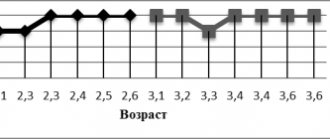Deviant behavior is any behavior that deviates from social norms. The key point is that norms are set in relation to a particular society. Therefore, behavior that is normal for some people is considered undesirable in another culture.
There is no generally accepted classification of types of deviant behavior. Below are several different classifications depending on the characteristics taken as a basis.
According to the goals pursued by the individual, deviant behavior occurs:
- selfish orientation - the desire to obtain selfish material gain through dishonest actions or offenses (theft, deception, fraud, speculation);
- aggressive orientation – crimes against the person (rape, murder, beatings, insults);
- socially passive orientation - avoidance of fulfilling social normative responsibilities, avoidance of an active lifestyle and solving necessary problems (absenteeism from work and school, various types of addiction, vagrancy, suicidal thoughts).
In terms of results, deviations from the norm are:
- positive – the individual’s actions are aimed at overcoming outdated standards and contribute to changes in the social system for the better;
- negative – human actions are aimed at destroying the social system, leading it to dysfunction and disorganization.
Some experts divide deviant behavior into the following types:
- antisocial (delinquent) – a person’s actions contradict legal, moral, ethical and cultural norms;
- asocial - an individual commits actions that do not correspond to the social and legal norms of the society in which he lives, as well as customs and traditions;
- self-destructive - such behavior threatens the development and integrity of the personality itself.
Deviant behavior in childhood and adolescence may include a combination of several types or manifest itself in only one. Such changes can appear very early due to congenital causes, arise as a result of physical injuries that affect brain activity and neurological condition, or be formed during the process of upbringing or under the influence of unfavorable social and psychotraumatic factors.
The assessment of one's actions in children and adolescents can also be different. Some feel guilty, which causes their self-esteem to drop and neuroses to appear. Others consider their behavior normal and justify it, even if society considers it deviations from the norm.
How deviant behavior manifests itself
Schoolboy
- fights too often;
- hooligans;
- cruel to peers or animals;
- spoils other people's things;
- sets something on fire;
- steals;
- often lies;
- skips school, violates school rules;
- leaves home, wanders;
- behaves defiantly, deliberately provokes other people into conflicts.
Deviation can be of two types. The first includes such violations that imply criminal liability, in other words, criminal. In this article we will not dwell in detail on this particular form; the subject of the article will be manifestations related to the second type - violations as a result of distortion of social attitudes that do not imply criminal liability, as well as deviations due to learning difficulties and an unfavorable family environment. Most often, the prerequisites for the appearance of such deviations are formed in childhood and become fixed in adolescence.
Reactionary foundations of disorganization of actions
There are certain types of reactions characteristic of children with a disorganized manner of action.
For younger children these are:
- protest. Occurs when there is increased imposition of something, or restriction of activity. Active protest is manifested by aggression, rudeness, and damage to property. Passive - hostility, deliberate silence, suicide attempts, starvation, running away from home. Physiological signs – enuresis, digestive disorders, hacking cough;
- refusal is a reaction to dissatisfaction with the sense of security and communication in very young children. Manifestations: lack of activity, desire to communicate, lack of emotion. No response. There is no desire for gaming activities. Everything is not interesting, they are not able to enjoy sweets or favorite toys;
- imitation - imitating the negative traits of authority figures. Children adopt bad habits and antisocial activities;
- compensation - the child compensates for the failures of one activity with the achievements of another. Failures in educational activities are compensated by hooliganism and theft. Fears and timidity are replaced by bullying other children, extreme car and motorcycle riding.
Reactions in teenagers:
- emancipation - resistance to the rules established by adults, rejection of help, disregard for advice and tips;
- grouping - the creation of antisocial groups;
- hobbies - aimed at satisfying interest in a specific activity. Excitement is satisfied by card or other games for money, leadership - by situations of leadership (gangster group). But even if hobbies are positive (sports, art, beauty), they can also destroy acceptable rules of action. They are provoked by refusal to attend school, carrying out illegal acts, making inappropriate acquaintances, ignoring relatives, and committing life-threatening acts.
Reasons for deviant behavior
A deviation can be formed as a result of initially given organic reasons or as a result of violations in the process of development and education. Initially predetermined causes include genetic developmental defects, birth injuries, disturbances in the formation and development of various systems and functions of the body (intellectual development, features of mental operations, etc.). These reasons create conditions for the occurrence of disorders (for example, in hyperactive children, mentally retarded, autistic). But, more often than not, they only determine the risk group for the development of social deviant behavior in children and adolescents. A student may not have any problems with discipline, but at the same time have such developmental disorders. Moreover, under subjectively difficult stressful conditions, such a schoolchild or teenager may begin to behave in a way that falls under the definition of a deviant child. Risk conditions can be associated with various areas of life.
In the family it is:
- antisocial character of the family as a whole or of its individual members: marginal lifestyle of parents, alcoholism, drug addiction, etc.;
- single-parent family or severe disruption of the relationship between parents;
- violations in the style of family upbringing (such as hyper or hypoprotection, family idol, etc.);
- physical or psychological violence in the family (both in relation to children and in relation to other family members, which children witness).
At school it is:
- priority in ensuring the personal authority of the teacher at any cost (including through humiliation and insults of the child);
- the complexity of tasks exceeds the student’s real capabilities (interest in learning and knowledge is lost, the teenager is looking for other ways to assert himself and compensate for his own failure);
- it is difficult for a student to find his place in a team, or the team chooses him as a means of solving their own socio-psychological difficulties, and this can be expressed in boycotts, ridicule, and bullying.
If any of the listed reasons are present, then the process of forming and consolidating the psychology of deviant behavior looks like this: 1. The student does not know how to behave in new, unusual conditions. The methods known to him do not help, and he has not yet learned new ones or does not know how to behave differently. 2. The student tries to build relationships with others, but his attempts are not successful. As a result, he becomes exhausted, becomes convinced of his failure and is not confident in his abilities. At the same time, his anger towards what is happening appears and grows, and this already pushes the little personality to violate the rules accepted in society. 3. The situation becomes psychologically unbearable for an immature person, and she does not know how to resolve it in an acceptable way. 4. Further deviation from the norm can be formed in one of two ways. Or the student commits unacceptable actions and at the same time understands the incorrectness of his reaction. In this case, he experiences a feeling of guilt, his self-esteem becomes low and the teenager finds himself in a situation of increasing psychological stress. As a result, various psychological disorders (neuroses, psychoses) may arise that require qualified help. Or the teenager commits negative actions and at the same time justifies them. He does not have an internal conflict in connection with the way he behaves; he acts with the aim of obtaining benefits or increasing self-esteem, position among peers, and self-affirmation.
Depressive disorder
Certain age periods are distinguished by their own depressive disorders.
Young children, up to 3 years old, become sad and avoid eye contact. There is a delay in the acquisition of new skills and achievements according to the age period. Self-harming behavior is typical: biting, hitting oneself, hitting one's head. Calming movements include thumb sucking, rocking, and monotonous walking.
Younger schoolchildren become apathetic, irritable, and withdrawn. There is a loss of interests and a decrease in intellectual activity. Sleep is disturbed.
Adolescent depression is determined by negativism and rapid mood swings. Disturbing feelings of guilt, self-accusation. Sleep and eating disorders are typical. Negativism and aggressiveness provoke deterioration in relationships with friends and problems in educational activities. Suicide attempts are a common symptom.
Prevention of deviant behavior
To prevent the development of deviations in children and adolescents, parents need to pay attention to both the family attitudes and upbringing models adopted in their family, and the psychological atmosphere surrounding their child at school or kindergarten. It is important to create an atmosphere of acceptance, understanding and security in the family. At the same time, it is necessary to ensure clarity of boundaries and rules in the family: what is prohibited in our family, and what is permissible in our family is allowed. It is important that parents have a clear understanding of the principles on which they are raising their children, what goals they are trying to achieve, and whether their methods of achieving educational goals are effective and whether they do not cause more harm to children. It is equally important that family rules are communicated and explained to children, because only understanding will ensure that children ultimately adopt these rules as their own. Otherwise, incomprehensible rules and double standards imposed by force cause a desire to break them in every case when punishment can be avoided. It is also necessary to take into account and clarify the motives of the little person’s behavior in order to avoid unfair punishment in cases where he was driven by an understandable desire to protect himself, perhaps in a not entirely constructive way. In this case, the main goal of the parents is to understand what happened and help him choose socially acceptable ways to regulate relationships. It is also very important to provide a girl or boy with a person-centered approach in educational institutions, at least by choosing a school with appropriate values and principles of education. Flexibility in relation to educational opportunities will help to avoid situations of chronic failure and will allow the student to adequately assess his contribution and responsibility in educational activities. Parents can provide great assistance to children in the development of emotional and social intelligence by explaining the emotional states of them and other people in interaction situations: what a person feels, why he reacts in this way, how the situation could be resolved in a better way, etc. Children and adolescents need to name their states and expand their experience in building relationships with other people. A teenager with developed social and emotional intelligence is less susceptible to irritability and impulsive behavior, is emotionally more stable and his adaptive capabilities are higher - which means that in a new and difficult situation for him, he is less at risk of reacting in a disturbed way.
Hyperkinetic disorder
Develops at an early age. Determined by excessive activity, difficulty concentrating, especially regarding intellectual tasks. The children's activities are poorly organized: they grab onto a new task without finishing the previous one.
Restless, restless, easily distracted by extraneous stimuli. Therefore, it is difficult for a hyperactive student to sit in school classes. He is lost in his own dreams and is inattentive. Learning problems make it difficult to learn new knowledge, causing delayed cognitive development.
Impulsivity is manifested by thoughtless, unexpected actions, sometimes of a dangerous nature. Children run out onto the roadway, climb onto roofs, and play with flammable objects. Impulsivity is also expressed in tactless, inappropriate language. The mood changes quickly. Patients are quick-tempered and unbalanced.
Subsequently, such children, rejected by their environment, become aggressive, express protest, and are involved in illegal acts.
Correction of deviant behavior
Due to the fact that the causes of behavior disorders in children and adolescents lie in different areas of their lives, both family and social development of the child, an integrated approach is required to correct them. It is important to evaluate the boy or girl for biological reasons for deviant behavior and, if present, provide adequate treatment. It is also necessary to review the methods of upbringing in the family, established models of interaction between adults and younger family members. Here, consultations with a family and child psychologist will provide invaluable assistance, since it is within his competence to see and help correct those aspects that, due to their familiarity and routine, may be invisible to parents. Children and teenagers often find themselves in difficult situations simply because they lack social skills and abilities. They do not know how to respond to provocation, how to communicate their dissatisfaction and disagreement in an acceptable way, and become upset and angry when other people's reactions go against their expectations. To develop such skills, on the advice of a psychologist, role-playing games are used, creating difficult social situations and allowing a young person or deviant teenager to find new ways of interaction in the “laboratory conditions” of the game, in a supportive atmosphere. The student receives feedback on his ways of interacting with adults and peers and learns to understand how his actions and actions can be reflected in the reactions and behavior of other people. In group or individual sessions with a psychologist, children learn how they can satisfy their needs for self-expression without causing harm to other people and themselves, and also gain skills in socially acceptable behavior. With the help and support of a specialist, the “difficult teenager” consolidates new abilities and finds the strength and opportunity to transfer the acquired skills from a learning and gaming situation to a real life environment. Deviant behavior of children and adolescents causes a lot of strong feelings among parents and teachers, a lot of anger, fear, and indignation. However, a person with disrupted behavior often suffers from the inability to solve difficult life situations for him in a socially positive way. Often deviant behavior is a cry for help, a signal that the student is experiencing serious trouble and needs support. Try to hear this call and seek help in a timely manner for your children and yourself!
If you or your children need psychological help, call tel. and make an appointment with a psychologist in St. Petersburg!
Least severe types of behavioral disorders
One of the weaker malignant forms of disorganization of activity is behavioral disorder limited to the family. It is determined by the aggressive, rude, cruel actions of the patient exclusively in a family environment with respect to relatives or one of the household members. Outside the family, children behave in their usual way. Outsiders are unaware of the problem.
The pathological activities of a child are varied: damage to things, clothes, furniture, theft, aggression, use of physical force. Often inappropriate actions are directed at one of the family members.
The reason for such changes is the departure of one of the parents, the appearance of a stepfather or stepmother. Moreover, aggression is not necessarily directed specifically at the culprit - any family member can suffer.
Pathological acts can take on an extreme degree of development. It happens that children organize arson and other global damage to property.
Often this type of defect provokes the birth of the youngest, next child. Jealousy directs aggression against the new baby, then the offender breaks the “rival’s” toys, may hit, does not want to share, and is even capable of taking regressive forms of action: stop going to the potty, consuming the younger one’s food.
Children are also capable of directing aggression towards their parents, becoming angry, refusing to communicate, and engaging in opposition.
Oppositional defiant disorder is the mildest form of the disorder. Occurs among children under 10 years of age. Characterized by provocative, defiant, hostile forms of action, disobedience, rebellion. However, there is no aggression, cruelty, or antisocial acts that violate the law.
Patients are irritated, easily offended, and lose self-control. Characterized by a high level of frustration. They tend to blame other people for their own failures and mistakes. They ignore comments and requests from adults. Capable of deliberately annoying, doing out of spite. They are rude and often become provocateurs of quarrels.
Integration into society
Typically, children with behavioral problems have difficulty making contact with teachers, psychologists, and adults, explaining this with the expression “they don’t understand me.” And indeed, in order to create a trusting relationship with such a child, you need to have a share of sympathy, interest in his life, hopes and worries, be able to listen patiently, give advice, empathize and move from free communication to guidance in a timely manner. Not every parent is capable of this, and certainly not every teacher. But this is the only way to reach children with behavioral disorders, form their understanding of universal human values, develop morally positive traits and character traits, and also help them adequately assess the picture of the world and be accepted into society.









